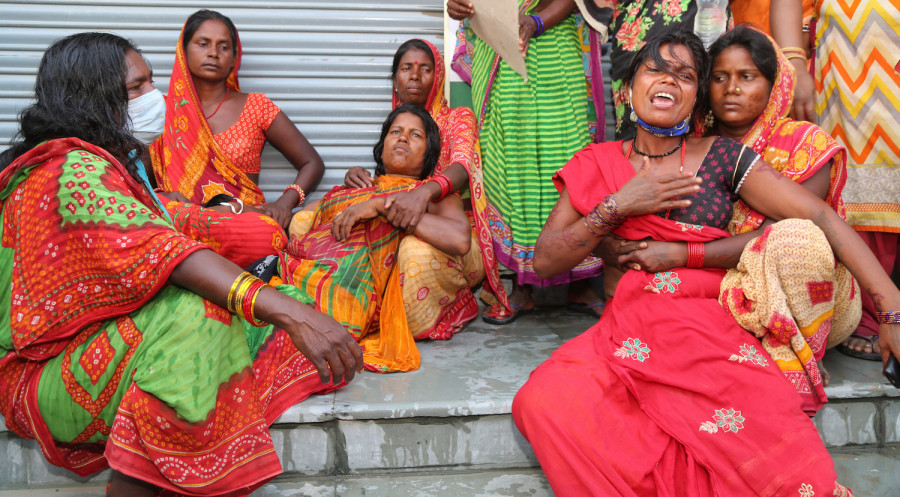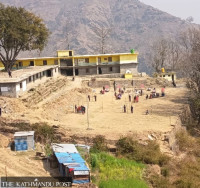National
Lack of probe into deaths at hands of police concern for UN
Four special rapporteurs on human rights remind Nepal of its obligation to look into such cases, punish perpetrators. Officials say they are unaware of such correspondence.
Binod Ghimire
Sambhu Sada Musahar, 23, from Sabaila Municipality, Dhanusha died in judicial custody on June 10 last year. He had been in detention since May 26, 2020, when he had surrendered himself to the police after he hit two persons, one of whom died, with a tractor.
His family tried to file a first information report (FIR) to the district police but it was rejected. The FIR was finally registered at the district attorney’s office after three days following pressure from human rights activists and local residents who held demonstrations claiming Sada died due to excessive torture.
The district attorney’s office was ready to receive the complaint only after the Office of the Attorney General issued a directive to this effect following a delegation of the human right activists who had approached it in Kathmandu.
“However, there has been no progress in investigating in the case,” Praveen Yadav, programme manager at Terai Human Rights Defender Alliance, told the Post. “There’s always a ready answer from the police saying that they are investigating the case.”
At least six cases of deaths either in police custody or in police action have been reported in a nearly one-year period between October 2019 and August 2020 but there hasn’t been complete investigation into a single case, let alone action against perpetrators.
Such gross negligence of police brutality has now caught the eye of the United Nations.
Four United Nations special rapporteurs on human rights have asked the Nepal government to provide details of investigations and actions taken against perpetrators, if any and sought details on the steps taken towards providing justice to the victims.
In their written correspondence to the Ministry of Foreign Affairs, the special rapporteurs have mentioned six cases of deaths either in police custody or in police between October 2019 and August 2020. The correspondence mentions about five other cases in addition to Sada’s custodial death.
Bijay Mahara, 19, from Garuda Municipality, Rautahat was severely tortured by Nepal Police while in custody and died in course of treatment on August 27, 2020.
Durgesh Yadav, 24, from Aurahi Rural Municipality, Siraha died in police custody on July 1, 2020 and Rajan Yadav from Ramgopalpur Municipality-7, Sahasaula, Mahottari district was shot dead on May 24 last year on charges of drug peddling.
Similarly, Rasikul Alam, 38, from Jhapa Rural Municipality, Jhapa was killed in a police shooting on August 26, while participating in a demonstration against the arrest of two Muslim men who had been accused of slaughtering an ox.
“Please provide the details, and where available the results, of any additional investigation, and judicial or other inquiries carried out in relation to the death in custody of the above-mentioned persons,” reads the correspondence.
The Special Rapporteur on torture and other cruel, inhuman or degrading treatment or punishment, the Special Rapporteur on extrajudicial, summary or arbitrary executions, the Special Rapporteur on the rights to freedom of peaceful assembly and of association and the Special Rapporteur on minority issues have also raised concerns over the government’s reluctance towards investigating such cases.
“It is reported that police routinely refuse to accept complaints and to register First Information Reports (FIRs, the initial complaints to police which formally initiate investigations); and when FIRs are registered, police and prosecutors routinely delay in carrying out investigations, even when issued orders and legal rulings are made by the Courts of Appeal and Supreme Court,” reads their correspondence.
It is Nepal government’s obligation to investigate, identify those responsible for acts of torture and ill-treatment and bring them to justice under articles 7 and 12 of the Convention against Torture and Other Cruel, Inhuman or Degrading Treatment or Punishment, of which Nepal is a signatory.
“If no investigative action has been initiated, please explain how this is compatible with the international human rights obligations of Nepal,” the four rappoteurs said, according to human rights activists.
The officials at the Foreign Ministry say there are different inquiries from the United Nations, so they are unaware if there has been any response on the issue.
“We send the inquiries to the respective ministries and based on their feedback we report to the special rapporteurs,” Sewa Lamsal, spokesperson at the Ministry of Foreign Affairs, told the Post. “I am not aware about this particular inquiry.”
Different reports suggest the police is reluctant to receive the complaints against their colleagues allegedly involved in the torture. Responding to the writs filed against the police's reluctance in receiving the complaints against criminal cases with the police’s involvement, the Supreme Court last month directed the government to form a separate mechanism, independent of Nepal Police, to investigate them.
The ruling by the division bench of Justices Ishwar Prasad Khatiwada and Kumar Regmi made public earlier this week said a separate mechanism comprising experts from different sectors is necessary as impartial investigation by the police against its officers can be doubted.
Constitution of a mechanism separate from Nepal Police is necessary for an independent, fair, impartial, and effective investigation, the court said in the verdict.
Human rights lawyers, who had filed the petition against police reluctance to register complaints against them, had called the verdict a landmark towards providing justice for the families of victims who have been killed by the police either after taking them into custody or by excessive use of force.
The human rights defenders say the reluctance in investigating the criminal offences is a serious issue. Bikash Basnet, programme manager at Advocacy Forum, said it is high that some steps need to be taken to make the police responsible.
“Maybe we can incorporate such issues in the provincial police laws all the provinces are readying at present,” he said.




 27.41°C Kathmandu
27.41°C Kathmandu














